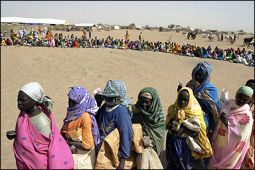Darfur refugees urge rebel leaders to unite and make peace
Oct 27, 2005 (ABOU SHOUK CAMP, Western Sudan) — Refugees from Darfur’s bloody 2-1/2 year conflict urged rebel leaders to use an upcoming meeting to end their bickering and get on with the task of making peace with Sudan’s Khartoum-based government.
 Some of the millions of people who fled to dusty refugee camps to escape marauding bands of so-called Janjaweed militia said they hoped Friday’s Sudan Liberation Army (SLA) congress will heal a rift in the rebel leadership that has hindered African Union-sponsored peace talks with Khartoum.
Some of the millions of people who fled to dusty refugee camps to escape marauding bands of so-called Janjaweed militia said they hoped Friday’s Sudan Liberation Army (SLA) congress will heal a rift in the rebel leadership that has hindered African Union-sponsored peace talks with Khartoum.
Divisions between SLA Secretary-General Minni Arcua Minnawi and President Abdel Wahed Mohamed el-Nur allowed the sixth round of the talks to end last week with little progress towards bringing peace to Sudan’s western region of Darfur.
But many people hope the congress will bring a united SLA position that will help the SLA forge a deal to bring an end to violence the United States has described as genocide.
“They need to unite and go back to the talks united,” said Yehya Mohamed Adam, who was chased from his home town Tawila in North Darfur to the Abou Shouk camp almost two years ago.
“Once they unite they will be strong and can begin to stop the looting and robbery,” he said.
The rebels have already begun informal meetings in their areas in South Darfur state ahead of official talks.
Tens of thousands of people have been killed and more than 2 million forced to flee to makeshift camps in Darfur during the revolt launched by non-Arab rebels in early 2003, sparking a humanitarian emergency. The rebels accuse the central government of monopolising wealth and power.
Those in the camps, mostly from the same non-Arab tribes as the rebel groups, give testimony of mass rape, executions and burning of their villages by the Janjaweed. The Arab militia men say they say were working for the government.
Many roads in Darfur have become no-go areas for U.N. humanitarian staff because of attacks by armed men targeting aid and commercial convoys.
Khartoum denies the charge of genocide but the International Criminal Court is investigating alleged war crimes committed during the fighting.
People in the camps were impatient for the rebels to engage in earnest at the AU talks in the Nigerian capital Abuja and swiftly move towards the dividends that a deal can bring.
“In the end what we want from them is results,” said Babiker Abdel Razeq, a community leader from the largest non-Arab tribe, the Fur. “They need to get on with the problem at hand which is giving us our rights and compensation for our losses.”
LEADERSHIP DIVIDED
SLA commander Ali Mokhtar, who works with the 6,000-strong AU force monitoring a shaky ceasefire in Darfur, told Reuters he was not worried about his movement on the ground, but rather that the leadership at the talks could not agree.
“I don’t think the SLA is in danger of falling apart,” he said. “But I am worried about these personal differences between the secretary-general and the president.”
Minnawi and Nur rarely present a united front and the secretary-general did not attend the last round of talks after President Nur unilaterally changed the list of SLA negotiators.
Minnawi is seen to control more field commanders because he is often in Darfur. Nur suddenly returned to Darfur for the first time in more than a year on Wednesday, which some speculate was because he felt threatened by the congress. It is still not clear if he will attend.
But people suffering in the hundreds of camps throughout remote Darfur remain frustrated by the internecine squabbling.
“We are living in tough conditions,” said al-Hajj Tibbih, who has been in the Abou Shouk camp for almost two years. He had not heard of the SLA congress. “They are fighting for the same cause – why should they have differences?” he asked.
Camp resident Abdel Jabbar Eissa said they were a long way from solving the problem of Darfur.
“The only solution is to disarm the Janjaweed, and the government is not serious about doing that,” he said. “I expect I may still be in this camp in eight years time.”
(Reuters)
